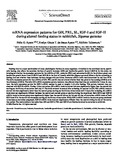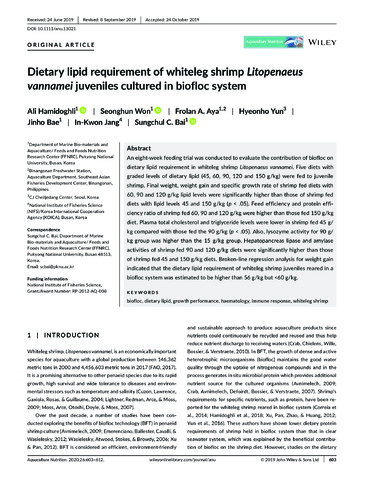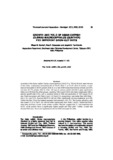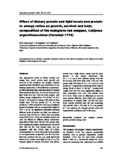mRNA expression patterns for GH, PRL, SL, IGF-I and IGF-II during altered feeding status in rabbitfish, Siganus guttatus.
Share
Abstract
Feeding time is a major synchronizer of many physiological rhythms in many organisms. Alteration in the nutritional status, specifically fasting, also affects the secretion rhythms of growth hormone (GH) and insulin-like growth factor-I (IGF-I). In this study, we investigated whether the expression patterns for the mRNAs of GH, prolactin (PRL) and somatolactin (SL) in the pituitary gland, and insulin-like growth factor I and II (IGF-I and IGF-II) in the liver of juvenile rabbitfish (Siganus guttatus) follow a rhythm according to feeding time and whether these hormone rhythms changes with starvation. Hormone mRNA levels were determined by real time PCR. The daily expression pattern for the mRNAs of GH, PRL and SL was not altered whether food was given in the morning (10:00 h) or in the afternoon (15:00 h). The daily GH mRNA expression pattern, however, was affected when food was not available for 3 days. In contrast, the daily expression pattern for IGF-I mRNA reaches its peak at roughly 5–6 h after feeding. This pattern, however, was not observed with IGF-II mRNA. During 15-day starvation, GH mRNA levels in starved fish were significantly higher than the control fish starting on the 9th day of starvation until day 15. The levels returned to normal after re-feeding. In contrast to GH, PRL mRNA levels in starved fish were significantly lower than the control group starting on the 6th day of starvation until 3 days after re-feeding. SL mRNA levels were not significantly different between the control and starved group at anytime during the experiment. Both IGF-I and IGF-II mRNA levels in starved group were significantly higher than the control fish on the 3rd and 6th day of starvation. mRNA levels of both IGF-I and II in the starved fish decreased starting on the 9th day of starvation. While IGF-I mRNA levels in the starved group continued to decrease as starvation progressed, IGF-II mRNA levels were not significantly different from the control during the rest of the starvation period. The results indicate that aside from GH and IGF-I, PRL and IGF-II are likewise involved in starvation in rabbitfish.
Suggested Citation
Ayson, F. G., de Jesus-Ayson, E. G. T., & Takemura, A. (2007). mRNA expression patterns for GH, PRL, SL, IGF-I and IGF-II during altered feeding status in rabbitfish, Siganus guttatus. General and Comparative Endocrinology , 150(2), 196-204. https://doi.org/10.1016/j.ygcen.2006.08.001
Subject
feeding behaviour; growth rate; hormones; nutrition; pituitary gland; reef fishes; secretion; starvation; feeding; gene expression; food availability; rhythms; liver; food; polymerase chain reaction; Siganus guttatus; somatotropin; prolactin; Somatolactin; Insulin-like growth factor-I; Insulin-like growth factor-II; Rabbitfish; mRNA; Feeding time; Reef fish; fasting; nutritional status
Collections
- AQD Journal Articles [1249]
Related items
Showing items related by title, author, creator and subject.
-
Dietary lipid requirement of whiteleg shrimp Litopenaeus vannamei juveniles cultured in biofloc system
Hamidoghli, Ali; Won, Seonghun; Aya, Frolan; Yun, Hyeonho; Bae, Jinho; Jang, In-Kwon; Bai, Sungchul C. (Wiley, 2020-06)An eight-week feeding trial was conducted to evaluate the contribution of biofloc on dietary lipid requirement in whiteleg shrimp Litopenaeus vannamei. Five diets with graded levels of dietary lipid (45, 60, 90, 120 and ... -
Growth and yield of Asian catfish Clarias macrocephalus (Gunther) fed different grow-out diets
Coniza, Eliseo B.; Catacutan, Mae R.; Tan-Fermin, Josefa D. (The Society of Israeli Aquaculture and Marine Biotechnology (SIAMB), 2003)Juveniles of the Asian catfish Clarias macrocephalus (3.6±0.17 g; 78.0±0.09 mm) were fed one of four diets: a laboratory-formulated diet of 18.9% (Diet 1) or 34.2% (Diet 2) protein, a com- mercial feed pellet of 28.9% ... -
Effect of dietary protein and lipid levels and protein to energy ratios on growth, survival and body composition of the mangrove red snapper, Lutjanus argentimaculatus (Forsskal 1775)
Catacutan, M. R.; Pagador, G. E.; Teshima, S. (Wiley-Blackwell, 2001)The approximate levels of dietary protein and energy that would sustain good growth and survival of the mangrove red snapper Lutjanus argentimaculatus (Forsskal) were determined in two feeding experiments. In the ...




